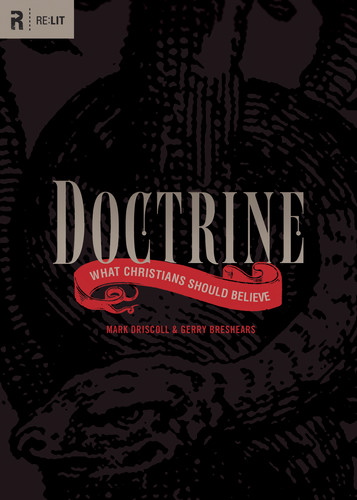
Mark Driscoll and Gerry Breshears
Reviewed by: Brenton Ferry
Doctrine: What Christians Should Believe, by Mark Driscoll and Gerry Breshears. Published by Crossway, 2010. Hardback, 463 pages, list price $22.99. Reviewed by OP pastor Brenton Ferry.
Mark Driscoll and Gerry Breshears are coauthors of Vintage Jesus (2008), Death by Love (2008), Vintage Church (2009), and now Doctrine. Breshears is on the faculty at Western Seminary, where Driscoll was trained. Driscoll is cofounder and pastor of Mars Hill Church, and cofounder of the Acts 29 Church Planting Network and Resurgence Literature. All three entities work together to contextualize the Christian faith in contemporary (youth) culture.
This book represents the doctrinal side of that contextualization program. It sets Driscoll's vision apart from the type of contextualization espoused by current leaders of the emergent church movement, insofar as the latter embrace postmodernity's disdain for dogmatism.
Doctrine covers thirteen topics: Trinity, revelation, creation, image, fall, covenant, incarnation, cross, resurrection, church, worship, stewardship, and kingdom. The book concludes with a final section of discussion questions for small groups.
Driscoll is sometimes identified as part of evangelicalism's resurgent Calvinistic movement. Besides puffs and quotes from Reformed authors, however, the book does not reflect the contours of Reformed thought at all.
For example, the authors omit the covenant of works (p. 177). They argue against limited atonement in favor of hypothetical universalism (p. 267). They condition regeneration upon faith and repentance (pp. 317, 436). There is no clear affirmation of unconditional predestination. The book excludes the fourth commandment from the abiding moral law (pp. 198–99), yet has a high view of the Lord's Day (pp. 381–84). It also contains pictures of Christ (pp. 208, 244), ignoring the second commandment.
The authors deny the Son's eternal generation and the Spirit's eternal procession (p. 28). They omit the incommunicable attribute of God's simplicity (p. 121). They say that God is covenantal "by nature of being Trinitarian" (p. 175), implying that covenant is opera ad intra rather than opera ad extra.
Driscoll and Breshears also hold to the charismatic view of spiritual gifts (p. 386). While they believe in a closed canon (pp. 64–65), they also believe in continuing special revelation, suggesting that unreached people "who follow the truth of general revelation can enjoy further special revelation about God that can lead to eternal life" through "dreams and visions of Jesus" (p. 40; see also p. 66). "Anyone [among unreached people groups] who is searching and willing to respond to the goodness of God … will receive special revelation" (p. 434).
The authors have a Baptist ecclesiology, restricting the church to "regenerated believers" (pp. 307–8) and seeing the church only as universal and local (p. 307). They have a Baptist understanding of water baptism (pp. 317, 325). They have a bald two-office view of elders and deacons (p. 319), and they believe in ordaining women as deacons (pp. 309, 321).
In short, Doctrine is a hodgepodge of various theological trajectories. When the authors compare Noah's drunkenness to "a hillbilly redneck on vacation" (p. 184), they reveal the nature of their contextualization project, which is to promote a Christianity that embraces irreverent adolescence. Theologically, this book does rise above that standard, but not by much.
March 30, 2025
On the Trail with a Missionary
March 23, 2025
Midnight Mercies: Walking with God Through Depression in Motherhood
March 16, 2025
March 09, 2025
Zwingli the Pastor: A Life in Conflict
March 02, 2025
February 23, 2025
African Heroes: Discovering Our Christian Heritage
February 16, 2025
© 2025 The Orthodox Presbyterian Church